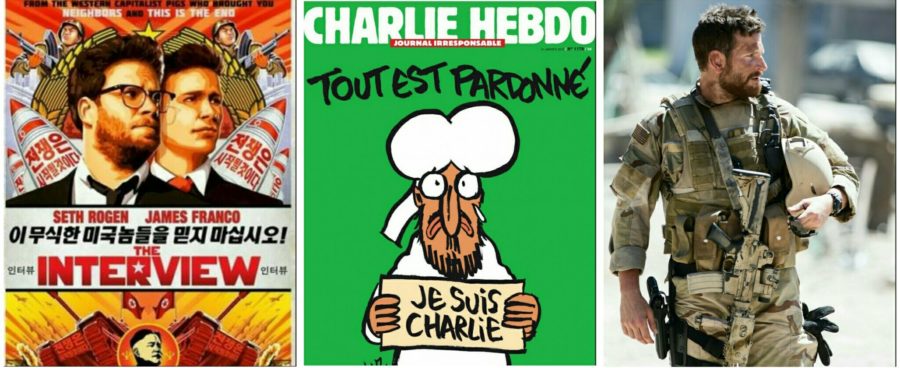By Daniela Santos
It is human nature to feel emotion and be sensitive, but we human beings need to understand that being driven by just our emotions can have a cost.
This warning applies especially for the world of media and entertainment. Overreacting to what is going on in publications, music, film, and other media platforms adds unnecessary attention that can hurt and/or over-hype the creation.
An example of over-hype is the butt-humor-filled Seth Rogen and Evan Goldberg directed comedy The Interview. It was known early on in the year that North Korean dictator Kim Jong Un disapproved of the film whose plot is about two buddies (James Franco and Seth Rogen) set to assassinate the leader. The disapproval was even more evident in early December when Sony received terroristic threats from the “guardians of peace” to not air the film. Movie theaters opted out of showing the film, and Sony officially stated that The Interview would be a film that the public would not ever see. President Barack Obama disapproved this decision and, in the end, select theaters did screen the film and it was also available to stream.
One could argue that the film was successful in the sense that it got publicity, for some Americans even thought that watching the film was their patriotic duty. But the scandal created such hype that I believe the majority of the public expected this silly comedy to be this intelligent satirical commentary on North Korea; much of the public was disappointed. Rotten tomatoes gave the film a critical rating of 54% and the audience rating was identical.
If one watches the film without these high expectations, I believe the film is good at being just a comedy and deserves a little more appreciation in regards to its humor. Franco and Rogen steal the show with their performance, and sure the film had some slow moments, but it was mostly a good raunchy comedy which fans of this genre will enjoy. The film does criticize a topic, but it is not exactly the topic that audiences had in mind. The film pokes fun at the entertainment news industry for their absurd celebrity topics that they consider news-worthy which may gone over audience’s heads due to their expectations. Forever and always will this film be overshadowed by its controversy just because the Korean dictator does not understand how non-threatening a Seth Rogen comedy is.
A film currently catching everyone’s attention is American Sniper. The film is breaking records for being the largest opening in January. It has brought in over $300 million in the first three weeks of its wide release and even managed to earn $31.9 million during the Super Bowl weekend. When I went to see the movie in late January. I still had to sit in the first couple of rows in the front.
But why is this war film about America’s deadliest sniper bringing in summer blockbuster sized profits? What is the appeal? The emotion. That is the one thing director Clint Eastwood did effectively well. He and Bradley Copper’s impressive performance were able to create tense, suspenseful, and hard to watch scenes that can convince anyone that this film is worth talking about for years to come. This skill has also lead audiences be oblivious to the flaws of the narrative.
The film makes the war in Iraq appear black and white; it is easy to tell who were the heroes and villains in the story which is well known to not be the case in reality. Those who did not read the autobiography may leave the theater feeling sympathetic for Chris Kyle even though the comments he has made in his autobiography are much more morally ambiguous. It is understandable that war can drastically change the mindset of a soldier but to call Iraqis “savages” like Kyle does in his book is impious.
The film paints war as a story of vengeance which also is a misinterpretation. Eastwood uses the narrative to create a story of an American hero that the audience is supposed to stand beside throughout the entire film and although it’s clear that there is an audience who thinks positively about Kyle after watching the film, I could not help but feel unsettled. I wanted more perspectives in the story that this film was obviously not supplying. I wanted to better understand this war and its soldiers but instead came out of the theater feeling desensitized and expected to applaud Kyle’s “accomplishment” of killing 160 combatants.
Becoming too emotionally engaged leads to being easily offended; in a world where it is easy to cross the line, it is important to understand that one’s own beliefs do not always correlate with others. Unfortunately two Islamic terrorists were incapable of understanding this lesson and thus lead to the assassination of 12 workers of the French satirical magazine Charlie Hebdo. Known for, ironically, criticizing religious extremists with their controversial covers displaying religious figures—such as Muhammad—the magazine has offended Muslim communities before but have been under French protection due to the country’s secularist ideals.
Later in January Vice had the opportunity of interviewing Luz, one of the survivors and the cartoonist responsible for the Prophet Muhammad covers. He showed the interviewer what a non-offensive Charlie Hebdo would look like; it was blank. Sadly New York Times, Al-Jazeera America, CNN and other news organizations chose to not publish the controversial cartoons out of fear and, therefore, let the terrorist quiet their voice. France, and the rest of the world, on Jan. 7 were tested on their freedom of speech; as heart breaking as this event was, it is important to learn from the magazine that self expression is impactful and should never be silenced.
It’s important to learn to control ones emotions. Thinking logically and giving credit where credit is due, especially for entertainment, is the best way to not cause any undesired effects.







